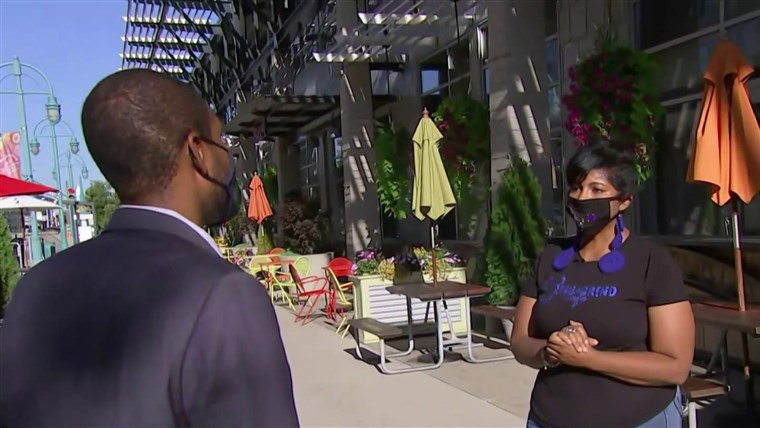Advertisement
On Politics With Lisa Lerer
It’s time to open the mailbag.
Hi. Welcome to On Politics, your guide to the day in national politics. I’m Lisa Lerer, your host.
Sign up here to get On Politics in your inbox every weekday.

So many variables that are likely to have a profound impact on our politics remain deeply unsettled right now.
With nearly everything up in the air, we thought it might be nice to tackle some of the questions that we can actually answer.
Our crack researcher Isabella Grullón Paz went through your emails and came up with a few questions that resonated for several readers.
Will we be ready to vote by mail?
A number of you had questions about this. Miriam Luse wanted to know which states will have mail-in ballots for the presidential election. And Anna See was curious about the kinds of checks that are in place to ensure that mailed balloting is accurate.
Over all, 23 percent of ballots were cast by mail in 2016, and 26 percent in 2018, according to a report by the Brennan Center for Justice. But the voting infrastructure varies dramatically by state.
Five states — Colorado, Hawaii, Oregon, Utah and Washington — plan to run all-mail elections in 2020. Last week, California announced that ballots would be sent to the state’s 20.6 million voters for the November election. In more than two dozen other states and the District of Columbia, any voter can request a mail ballot for any reason in November.
The remaining states do not guarantee that everyone who wants to vote by mail can do so, according to the report.
There’s plenty that can be done to secure mail ballots. The ballot envelope can be designed to prevent fraud, as it is in Washington State, where voters have to sign the envelope. That signature is compared to one that’s on file for the voter. States can also track the progress of ballots through bar codes that are scanned when they are dropped off at government offices and other locations.
And despite President Trump’s allegations to the contrary, research shows that vote-by-mail fraud is extremely rare.
The Tara Reade record
We also got a lot of questions about Tara Reade, the former Senate aide who has accused Joe Biden of sexual assault.
Patricia Nelson wanted to know a bit more about the complaint that Ms. Reade says she filed about her experience working in Mr. Biden’s office in 1993:
What makes everybody think the complaint that was filed would be in Vice President Biden’s locked papers at the university? If such a paper exists, wouldn’t he have pulled it out of the pile and shredded it?
While conservatives, media organizations and some liberals have called on Mr. Biden to release his files, it’s unclear whether the collection at the University of Delaware — where Mr. Biden donated his personal papers — would contain the complaint Ms. Reade has said she filed through the Senate’s office of personnel management in 1993.
Mr. Biden says it does not, initially claiming that such paperwork would be in the National Archives. The Archives immediately responded that any such personnel records would not be under its control but would rest with the Senate itself.
The secretary of the Senate said that her office had no legal discretion “to disclose any such information,” prompting Mr. Biden’s personal lawyer to ask what his campaign needed to do to locate any relevant documents and arrange for their release.
Since then, the Biden campaign has not taken additional public steps to locate the paperwork. Campaign officials are reluctant to open the Delaware papers to the public, arguing that the documents would help Republican opposition researchers find information to weaponize against him.
A number of former Senate staffers have told me that personnel files are generally not preserved in personal archives, for reasons of privacy. Yet, the archive could include other contemporaneous memos, notes or documents that could show whether Mr. Biden’s staff discussed Ms. Reade.
Amid this contretemps about paperwork, it’s important to remember that Ms. Reade says that her complaint detailed only her claims of sexual harassment — not the assault. So even if this complaint exists and is discovered, it won’t provide an answer to the central question of this whole controversy.
How is Congress working right now?
Sally Sheely asks:
With the Congress returning to Washington, I wonder how many of the congresspeople observed social distancing for their return, or did most of them travel by private plane? Are they being tested before entering the Capitol building?
I handed this one over to our ace congressional reporter Emily Cochrane, who’s been risking her health to report from Capitol Hill. She says:
How they handle social distancing and precautions depends on the lawmaker.
Most are wearing masks — Senator Rand Paul, Republican of Kentucky and the only senator to test positive for the coronavirus, is the notable exception — and are trying to distance themselves from one another, their staff members and reporters. A majority of Capitol Hill staff members are working remotely, with just a handful of the usual hundreds coming in every day.
Several lawmakers are still flying home (although many of the direct flights they’ve come to rely on have been canceled, which makes for a more challenging commute), while others have opted to drive between Washington and their homes.
Some have not gone home at all: Senator Lisa Murkowski, Republican of Alaska, told me she had not been home in just over two months because Alaska has such a strict 14-day quarantine requirement; it would prevent her from returning to Washington and being able to vote.
There is currently no virus testing on Capitol Hill for lawmakers (or staff members or reporters, for that matter.) Speaker Nancy Pelosi of California and Senator Mitch McConnell of Kentucky, the majority leader, rejected President Trump’s offer of tests for Capitol Hill, arguing that lawmakers should not take precedence over essential workers and families.
There’s been some notable pushback to that decision — from, among others, Senator Lamar Alexander, Republican of Tennessee, who is currently in isolation at home after a staff member tested positive for the virus — because of how much traveling these lawmakers do.
Send us your questions!
We’ll answer more of your questions in upcoming installments of On Politics. Tell us what’s on your mind: onpolitics@nytimes.com.
As many states edge toward reopening more of their economies, a debate has ensued among epidemiologists, public health officials, skeptical politicians, conflicted voters and Trump-aligned news outlets over how much trust should be put in experts’ recommendations.
Thomas Edsall, who contributes a weekly Opinion column, argued this week that President Trump, who has been suppressing expert voices within his administration, is “staking out his own universe of ‘alternative facts’” as a political solution that can obfuscate the president’s own mishandling of the coronavirus threat.
The re-election team’s digital campaign website, Army for Trump, and its Keep America Great campaign app make sure “his supporters are able to enter a self-contained, self-reinforcing arena where Trump reigns supreme,” Mr. Edsall wrote. “And the campaign gets detailed marketing information about those who go through the elaborate sign-up process.”
But some leaders are more focused on the facts, as Aaron E. Caroll, an Indianapolis-based contributing writer, wrote in an Op-Ed on Wednesday. “It would require a full statewide, random sample study to allow us to see what’s going on” with the virus, he wrote. “We’ve just seen that happen in Indiana. Thanks to a study done with the state’s help, we now know that it’s likely that about 2.8 percent of Hoosiers have so far been infected with this virus.”
He spoke to Nir Menachemi, the lead author of that statewide Indiana study, who said, “Given everything involved and especially the aggressive time frame, this study would not have been possible without a steadfast commitment, by the governor, for data-driven decisions.” (The governor, Eric Holcomb, is a Republican.)
— Talmon Joseph Smith
Let it go. Or at least, that’s what Snoop Dogg advises.
I’ll have what he’s having.
Thanks for reading. On Politics is your guide to the political news cycle, delivering clarity from the chaos.
On Politics is also available as a newsletter. Sign up here to get it delivered to your inbox.
Is there anything you think we’re missing? Anything you want to see more of? We’d love to hear from you. Email us at onpolitics@nytimes.com.
-
- Joe Biden’s inability to influence the debate about the coronavirus and the economy has worried some Democrats who want him to be more visible.
-
- A Republican flipped former Representative Katie Hill’s seat in California. Wisconsin and Nebraska also held votes Tuesday. See the results.
-


